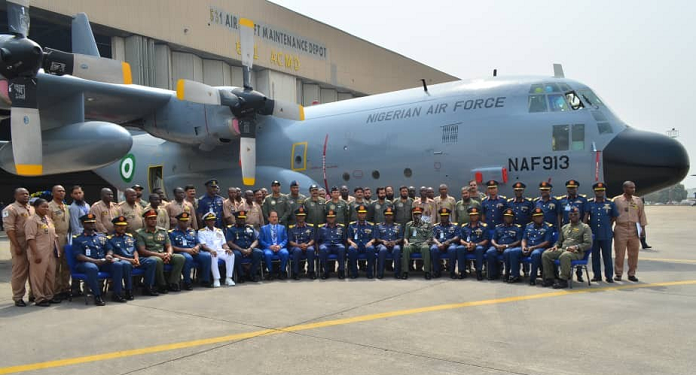The top 5 highest-paid forces in Nigeria are the Nigerian Air Force, Nigerian Army, Nigerian Navy, Department of State Services, and Nigerian Police Force. They offer competitive salaries to attract and retain well-trained personnel.
Nigeria, the most populous country in Africa, boasts a robust security apparatus. With various security challenges the nation faces, it is essential to have well-paid forces to maintain law and order. Nigeria’s security forces are crucial in maintaining the nation’s stability and confronting security challenges. These forces contribute significantly to Nigeria’s security apparatus and safeguard the nation’s interests.
In this article, we will explore the top five highest-paid forces in Nigeria.
List of 5 Highest Paid Forces in Nigeria
1. Nigerian Air Force (NAF)
- Year Established: 1964
- Entry Level Salary: N53,892 per month
- Highest Grade/Salary: The Air Chief Marshal earns over N1,724,283 per month

The Nigerian Air Force is categorized into commissioned and non-commissioned cadres. Officers enrolled through the Short Service Commission, Nigerian Defense Academy, or Direct Short Service Commission are considered commissioned, typically holding diplomas or degrees from reputable universities. The commissioned officers of the Nigerian Air Force receive a salary ranging from N187,159 to that of Air Chief Mashal N1.7 million. And the non-commissioned receive from N10,000 (recruit).
Officers of the Nigerian Air Force receive a decent salary package, which includes allowances for accommodation, feeding, and transport. They also receive other benefits such as health insurance and education support for their children. With the above information, the Nigerian Air Force stands as the highest in our list of the highest-paid forces in Nigeria.
2. Nigerian Army
- Year Established: 1960
- Entry Level Salary: N58,000 per month
- Highest Grade/Salary: The General earns over N1,500,000 per month

The Nigerian Army is one of the highest-paid forces in Nigeria. There are differences between the salaries of a non-commissioned officer (NCO) and a commissioned officer of the Army. The commissioned officers earn more than the non-commissioned officers. The main difference between a non-commissioned officer (NCO) and a commissioned officer in the Army is their rank and level of authority. NCOs are enlisted personnel who hold junior ranks and primarily focus on managing and leading soldiers. In contrast, commissioned officers have higher ranks and are responsible for planning and strategizing military operations.
Chief of Army Staff earns over N1,500,000 per month, the Second Lieutenant to the General (commissioned officers) earns between N120,000 and N1.5 million monthly, and the members of the non-commissioned officers earn between N58,000 and N90,000 monthly.
The Nigerian Army also offers its officers a decent salary package, which includes allowances for accommodation, feeding, and transport. They also receive other benefits such as health insurance and education support for their children.
3. Nigerian Navy
- Year Established: 1956
- Entry Level Salary: N51,000 per month
- Highest Grade/Salary: The Admiral earns over N1,358,595 per month

The Nigerian Navy is one of the highest-paid forces in Nigeria. Just like we have in the Army, there are commissioned and non-commissioned naval officers, of which commissioned officers earn more. The salary of the non-commissioned officers ranges from N51,000 to N300,000, while that of the commissioned officers is between N281,000 to N1.3 million.
The Nigerian Navy offers its officers a competitive salary package, which includes allowances for housing, feeding, and transport. They also receive bonuses and promotions for their hard work and dedication. Also, officers of the Nigerian Navy receive some allowances during their training.
4. Department of State Services (DSS)
- Year Established: 1986
- Entry Level Salary: N10,000 per month
- Highest Grade/Salary: Director General/N1.3 million monthly

The Department of State Services (DSS), Nigeria’s primary intelligence agency, boasts well-paid personnel. With responsibilities including counterintelligence and counterterrorism, the DSS offers attractive remuneration to its officers.
Regarding salary, DSS officers are generally well paid compared to other security agencies in Nigeria. The salary structure of DSS officers is determined by the Consolidated Para-military Salary Structure (CONPASS), which provides a framework for the remuneration of officers in various para-military agencies. DSS officers earn between N10,000 (recruit) and N1.3 million monthly, depending on your rank or position.
DSS officers receive monthly allowances to complement their salaries. Some of these allowances include:
- Risk Allowance: This allowance is provided to officers who work in dangerous situations or face heightened security risks.
- Rent Allowance: DSS officers are entitled to a monthly rent allowance to help cover their accommodation expenses.
- Transport Allowance: This allowance is given to officers to assist with transportation costs.
- Medical Allowance: DSS officers receive a medical allowance to cover their medical expenses.
In addition to these allowances, DSS officers also receive other incentives that come with their job offers. These may include:
- Training Opportunities: DSS officers are often provided with extensive training both within Nigeria and abroad. This helps to enhance their skills and improve their expertise in intelligence gathering, counterintelligence, and security operations.
- Job Security: Being a government agency, the DSS offers job security to its officers. They have regular employment benefits and are less likely to face issues related to layoffs or downsizing.
- Pension and Retirement Benefits: DSS officers enjoy a pension scheme and retirement benefits after dedicating a certain number of years to the agency.
- Opportunities for Career Progression: The DSS provides opportunities for career advancement through promotions, transfers, and postings to higher positions within the agency.
- Access to State-of-the-Art Equipment and Resources: DSS officers have access to modern equipment, technologies, and resources necessary to carry out their tasks effectively.
It is important to note that the specific details of allowances and incentives may vary based on an officer’s rank, experience, and tenure within the DSS. Additionally, the government periodically reviews and adjusts the salaries and allowances of DSS officers to ensure competitiveness and motivation.
5. Nigerian Police Force (NPF)
- Year Established: 1930
- Entry Level Salary: N51,113 per month
- Highest Grade/Salary: Inspector General of Police, earns N711,450 per month

The Nigerian Police Force is the fifth in our list of the highest-paid forces in Nigeria. Officers of the Nigerian Police Force are relatively well paid compared to other forces in Nigeria. Their salaries increase as they go up the ranks. For the Nigerian Police Force, the constable and corporal receive a monthly salary of N51,113. The Inspector General of Police receives ₦711,450.00, the Commissioner of Police ₦302,970.50, the Chief Superintendent of Police ₦199,723.96, the Superintendent of Police ₦172,089.06, the Inspector of Police ₦87,135.10, Sergeant Major ₦62,204.88, Sergeant ₦55,973.90.
The Nigerian Police Force faces numerous challenges, including issues related to salaries and allowances. The officers are typically not well-paid compared to the nature of their jobs and the risks they face. However, efforts have been made to improve their compensation packages. In recent years, the government has implemented reforms to increase officers’ salaries and allowances, including hazard and rent allowances.
Other incentives, such as medical care, insurance coverage, and pension benefits, are offered to attract and retain officers. Nevertheless, further improvements are necessary to ensure officers are appropriately rewarded for their valiant service and enhance their overall job satisfaction.
